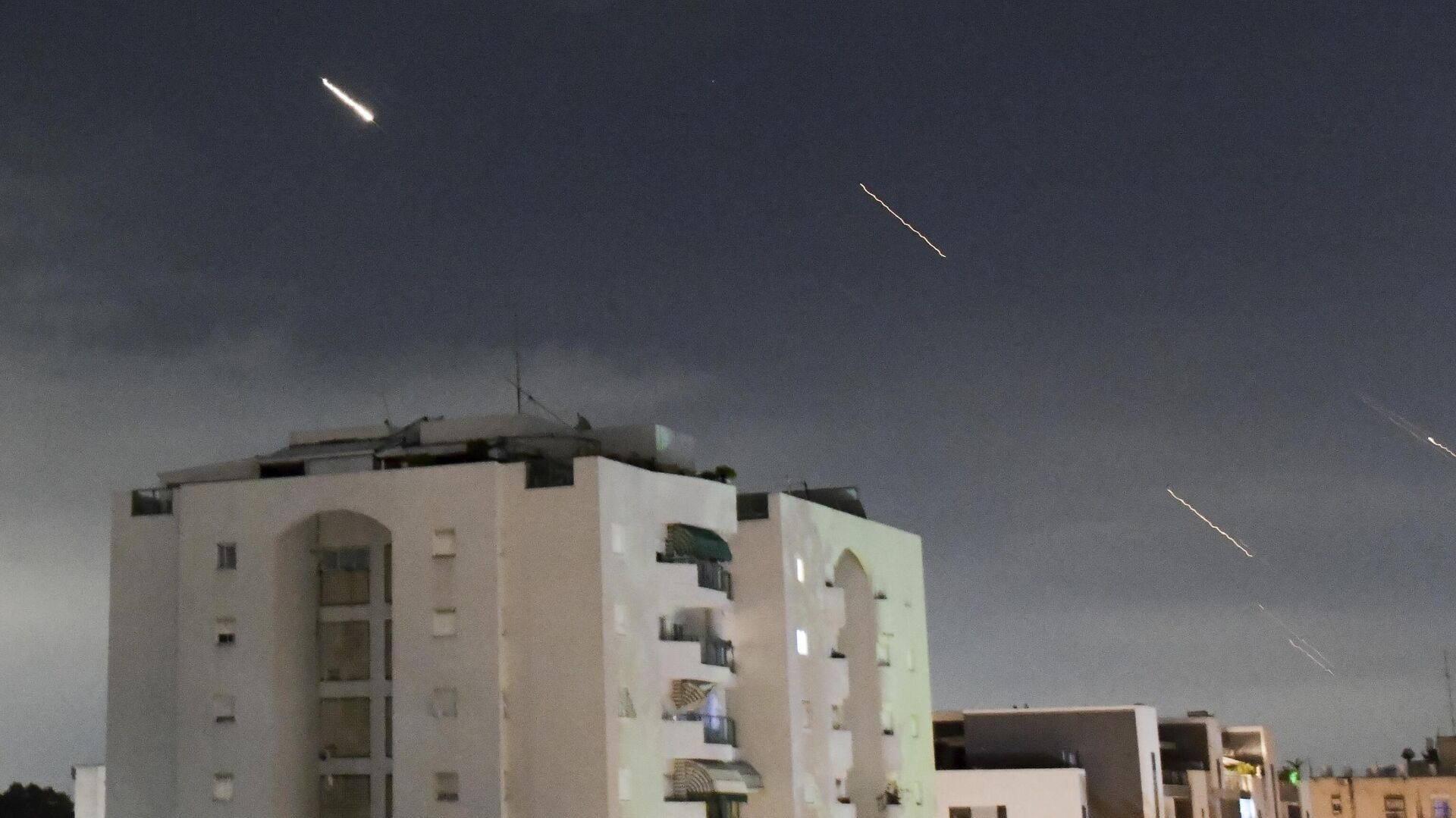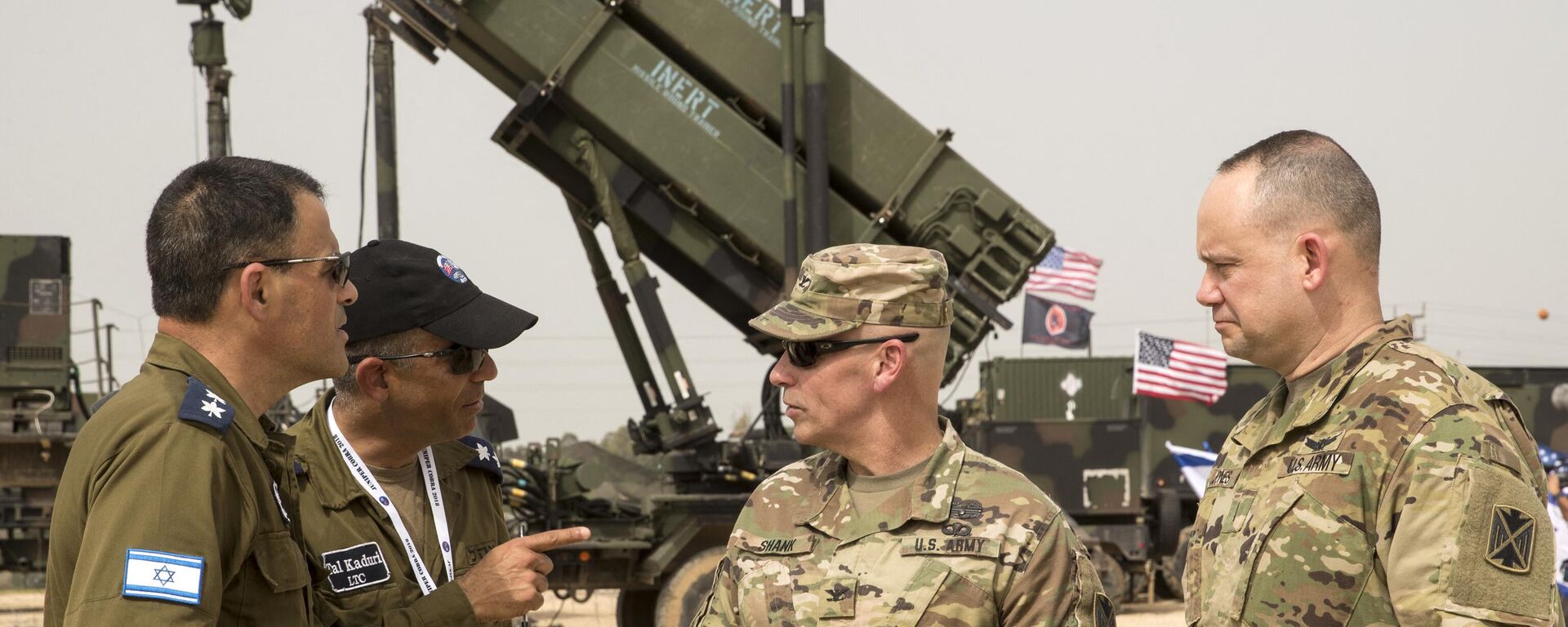https://sputnikglobe.com/20240421/us-was-shocked-at-worst-case-scenario-scale-of-irans-retaliatory-strike-on-israel-1118038806.html
US Was Shocked at 'Worst-Case Scenario' Scale of Iran’s Retaliatory Strike on Israel
US Was Shocked at 'Worst-Case Scenario' Scale of Iran’s Retaliatory Strike on Israel
Sputnik International
The Biden administration was shocked at the scale of Iran’s retaliatory missile and drone barrage into Israel on April 13, The Wall Street Journal reports.
2024-04-21T11:06+0000
2024-04-21T11:06+0000
2024-04-21T11:06+0000
us
palestine-israel conflict
hamas
gaza strip
iran-israel row
iran
islamic revolutionary guard corps (irgc)
tehran
joe biden
ebrahim raisi
https://cdn1.img.sputnikglobe.com/img/07e8/04/15/1118038439_0:161:3071:1888_1920x0_80_0_0_b03ecd4a1b18635182d6d02b3c0969d2.jpg
The Biden administration was shocked at the scale of Iran’s retaliatory missile and drone barrage into Israel on April 13, The Wall Street Journal reports.The scale of Tehran’s first direct attack on Israel "matched worst-case scenarios," US officials were quoted as admitting.As US President Joe Biden and his national security team huddled in the White House Situation Room watching the projectiles hurtling towards targets in Israel, they feared the NATO-bolstered defenses would not be enough to repel the assault. There had never before been an attempt to intercept so many drones, cruise and ballistic missiles at once, the report stressed.Throughout the Iranian attack, the US, Britain, France and Jordan joined Israel in shooting down incoming drones and missiles, with Tel Aviv’s anti-ballistic missile systems reinforced by US anti-missile and counter drone deployments carried out ahead of the anticipated operation.Although the Israeli side gave the US a heads-up minutes before the Iranian strike, there was no clarification about the targeted locations, US officials have claimed.US intelligence agencies reportedly failed to predict the extent of Iran’s assault, with some reports indicating only Israeli diplomatic facilities or other sites outside Israel might be targeted. It was only on April 12 that the White House national security spokesman John Kirby said Washington had received “better, firmer intelligence and information about the specific timing” of Iran’s looming attack.Iran's Islamic Revolutionary Guard Corps (IRGC) said seven of its members had been killed in the Israeli bombing of its consulate on April 1, including Brigadier General Mohammad Reza Zahedi, a senior commander in the Quds Force, and his deputy General Mohammad Hadi Hajriahimi. The Syrian Health Ministry said the next day that the attack had also killed four Syrians and injured 13 more.At the time, the Iranian Foreign Ministry said it "reserves the right" to respond to the Israeli attack and "punish the aggressor." Iranian President Ebrahim Raisi also vowed that Israel would pay a "heavy price" for the strike.After Israel attacked the Iranian consulate, an infuriated US Defense Secretary Lloyd Austin is said to have taken his Israeli counterpart Yoav Gallant to task in a telephone call for failing to mention the planned attack, a US official said.Another Israeli strike in the Gaza Strip on April 1 which killed seven aid workers with the World Central Kitchen (WCK) charity made matters even worse. Amid a torrent of condemnation, Biden reportedly made a call on April 4 to Israeli Prime Minister Benjamin Netanyahu, urging him to allow more humanitarian aid into the Gaza Strip, increase efforts to reduce civilian casualties. But Biden also pledged to defend Israel in case of an Iranian response.The US military set its classified plans for assisting Israel in motion, with a team dispatched to Tel Avid to co-ordinate the effort. Besides the destroyer USS Carney joining the USS Arleigh Burke in the eastern Mediterranean and gearing up to shoot down Iranian missiles, F-15E fighter jets arrived to help in the defense.When several days passed without an Iranian response, the prevailing assessment by US and Israeli intelligence agencies was that Iran was planning its first-ever massive direct attack on Israeli territory, said the WSJ report.After Tehran had concluded its self-defense strike on Israel, Biden reportedly told Netanyahu in an “intense” telephone to “take the win.”The anticipated Israeli retaliation triggered a flurry of shuttle and backroom diplomacy to stop further escalation of the Middle East tensions.Concerns were also raised that a retaliatory strike by Tel Aviv on Tehran might provoke a spiral of attacks by Iran's regional allies against US bases in Iraq and Syria.For all the US bluster about wanting to avoid an all-stops-out regional war in the Middle East, the most recent move out of Washington has been the House passage of legislation to provide for $26.38 billion in Israel-related aid, amid the country’s conflict with Palestinian organization Hamas and Iran.Netanyahu appears hell-bent on prolonging the war to ward off any political or legal challenges, as pundits have told Sputnik.
https://sputnikglobe.com/20240420/us-begged-israel-not-to-strike-iran-but-request-was-embarrassingly-ignored---reports-1118023508.html
https://sputnikglobe.com/20240420/us-greenlit-israeli-strike-on-iran-no-game-changer---former-netanyahu-advisor-1118027330.html
gaza strip
iran
tehran
israel
Sputnik International
feedback@sputniknews.com
+74956456601
MIA „Rosiya Segodnya“
2024
News
en_EN
Sputnik International
feedback@sputniknews.com
+74956456601
MIA „Rosiya Segodnya“
Sputnik International
feedback@sputniknews.com
+74956456601
MIA „Rosiya Segodnya“
israel's strike at iran not a game changer, israel airstrikes iran, iran israel tensions, did us warned israel, israel us relations, us reaction os israeli airstrike, iran vs israel, iran strikes israel, iranian attacks on israel, israel threatens iran, israel’s missile attack on iran, iran israel standoff, iran israel row, recent attcks in the middle east, middle east military escalation, iran’s role in the middle east, alliances in the middle east, iran strikes on israel, iran attacks israel, iran israel row, iran israel hostilities
israel's strike at iran not a game changer, israel airstrikes iran, iran israel tensions, did us warned israel, israel us relations, us reaction os israeli airstrike, iran vs israel, iran strikes israel, iranian attacks on israel, israel threatens iran, israel’s missile attack on iran, iran israel standoff, iran israel row, recent attcks in the middle east, middle east military escalation, iran’s role in the middle east, alliances in the middle east, iran strikes on israel, iran attacks israel, iran israel row, iran israel hostilities
US Was Shocked at 'Worst-Case Scenario' Scale of Iran’s Retaliatory Strike on Israel
Iran used over 300 drones, cruise and ballistic missiles in its attack on Israel on April 13, forcing the US, the UK, France and Jordan to scramble to help Tel Aviv bring the projectiles down. Israeli officials claimed that 99 percent of them were intercepted in the skies of Jordan, Lebanon and Syria.
The Biden administration was shocked at the scale of
Iran’s retaliatory missile and drone barrage into Israel on April 13,
The Wall Street Journal reports.
The scale of Tehran’s first direct attack on Israel "matched worst-case scenarios," US officials were quoted as admitting.
“This was on the high end, I think, of what we were—what we were anticipating,” said one unnamed senior official.
As US President Joe Biden and his national security team huddled in the White House Situation Room watching the projectiles hurtling towards targets in Israel, they feared the NATO-bolstered defenses would not be enough to repel the assault. There had never before been an attempt to intercept so many drones, cruise and ballistic missiles at once, the report stressed.
Throughout the
Iranian attack, the US, Britain, France and Jordan joined Israel in shooting down incoming drones and missiles, with Tel Aviv’s anti-ballistic missile systems reinforced by US anti-missile and counter drone deployments carried out ahead of the anticipated operation.
“The results of the defenses were unclear until all was said and done,” a senior Biden administration official present in the Situation Room at the time was quoted as saying.
Although the Israeli side gave the US a heads-up minutes before the Iranian strike, there was no clarification about the targeted locations, US officials have claimed.
US intelligence agencies reportedly failed to predict the extent of Iran’s assault, with some reports indicating only Israeli diplomatic facilities or other sites outside Israel might be targeted.
It was only on April 12 that the White House national security spokesman John Kirby said Washington had received “better, firmer intelligence and information about the specific timing” of Iran’s looming attack.
In retaliation for Tel Aviv's unprovoked April 1 attack on the Iranian Embassy compound in Damascus, Syria, Iran launched a massive drone and missile attack against Israel on April 13, assisted by Hezbollah and Yemen's Houthi-led armed forces. Over 300 projectiles were fired at Israeli territory from Iran, with Tehran claiming the strike "hit designated targets." Israel's military has claimed that 99 percent of the projectiles were intercepted. Tel Aviv responded to the attack on April 19 with a “limited” retaliatory strike on sites in Iran.
Iran's Islamic Revolutionary Guard Corps (IRGC) said seven of its members had been killed in the Israeli bombing of its consulate on April 1, including Brigadier General Mohammad Reza Zahedi, a senior commander in the Quds Force, and his deputy General Mohammad Hadi Hajriahimi. The Syrian Health Ministry said the next day that the attack had also killed four Syrians and injured 13 more.
At the time, the Iranian Foreign Ministry said it "
reserves the right"
to respond to the Israeli attack and "
punish the aggressor." Iranian President Ebrahim Raisi also vowed that Israel would pay a "heavy price" for the strike.
After Israel attacked the Iranian consulate, an infuriated US Defense Secretary Lloyd Austin is said to have taken his Israeli counterpart Yoav Gallant to task in a telephone call for
failing to mention the planned attack, a US official said.
Another Israeli strike in the Gaza Strip on April 1 which
killed seven aid workers with the World Central Kitchen (WCK) charity made matters even worse.
Amid a torrent of condemnation, Biden reportedly made a call on April 4 to Israeli Prime Minister Benjamin Netanyahu,
urging him to allow more humanitarian aid into the Gaza Strip, increase efforts to reduce civilian casualties. But Biden also pledged to defend Israel in case of an Iranian response.
The US military set its classified plans for assisting Israel in motion, with a team dispatched to Tel Avid to co-ordinate the effort. Besides the destroyer USS Carney joining the USS Arleigh Burke in the eastern Mediterranean and gearing up to shoot down Iranian missiles, F-15E fighter jets arrived to help in the defense.
When several days passed without an Iranian response, the prevailing assessment by US and Israeli intelligence agencies was that Iran was planning its first-ever massive direct attack on Israeli territory, said the WSJ report.
After Tehran had concluded its self-defense strike on Israel, Biden reportedly told Netanyahu in an “intense” telephone to “take the win.”
The anticipated Israeli retaliation triggered a flurry of shuttle and backroom diplomacy to stop further escalation of the Middle East tensions.
Concerns were also raised that a retaliatory strike by Tel Aviv on Tehran might provoke a spiral of attacks by Iran's regional allies against US bases in Iraq and Syria.
US media reported that Israel carried out a “limited” retaliatory strike on sites in Iran on Friday, with explosions reported near the city of Isfahan. Tasnim reported that nuclear facilities in Isfahan province were unharmed. Three Iranian officials confirmed to the New York Times that the strikes targeted an Iranian Air Force base near Isfahan.
For all the US bluster about wanting to avoid an all-stops-out regional war in the Middle East, the most recent move out of Washington has been the House
passage of legislation to provide for
$26.38 billion in Israel-related aid, amid the country’s conflict with Palestinian organization Hamas and Iran.
Netanyahu appears hell-bent on prolonging the war to ward off any political or legal challenges, as pundits
have told Sputnik.







